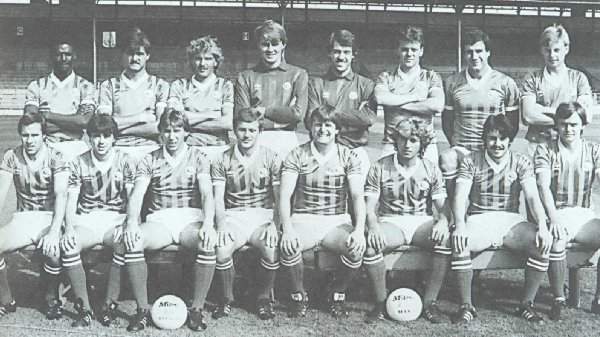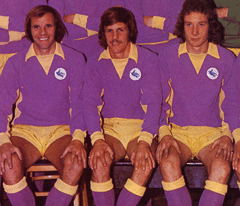
Perhaps I am mad, but I am going to compare the present Cardiff City team with a former England test cricketer who was born in Zimbabwe here! Please bear with me while I try to explain what I mean (and to all of the non cricket fans out there, I assure you that you won’t have to read endless paragraphs about that, fantastic, sport here!).
Graham Hick was a batsman who never fulfilled the massive potential he showed when he first started playing for Worcestershire about twenty five years ago because he couldn’t handle the step up in class that came with test cricket. At county level Hick had a fantastic record and he broke records galore, but when asked additional questions about his technique and temperament by test bowlers, he struggled and in time, Hick became known as a “flat track bully” which meant that in ideal conditions (i.e. batting on a flat cricket pitch and against modest bowling) there was no one better, but if the pitch was doing a bit and the bowling was of a higher quality, then he wasn’t half the player he could be.
After watching last night’s 6-1 demolition of a hapless Derby County team, I found myself thinking of Graham Hick because I believe that our record so far shows that, in certain circumstances, there is no one better than us in this division, but, when it comes to the tougher tests, there still have to be doubts about whether this City team has what it takes to clinch the top six spot that we are told we should expect.
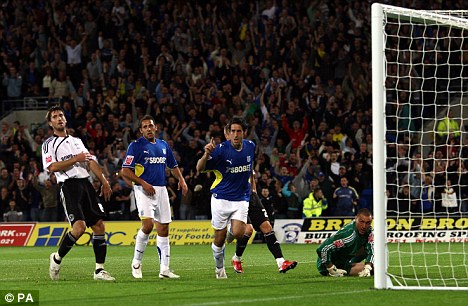 We are currently sitting in fifth position because our goal difference is so much more better than the other four teams that have the same number of points as us and this is despite the fact that three of our four defeats have been by two goal margins. The fact that we have an average home record at the moment of three wins and two defeats is not reflected in our goals for and against record which shows that we have scored thirteen and conceded four. This, along with the 3-1 win at Plymouth, shows that when we do get on top in matches, there are few, if any, teams in the Championship as capable as us of taking maximum advantage.
We are currently sitting in fifth position because our goal difference is so much more better than the other four teams that have the same number of points as us and this is despite the fact that three of our four defeats have been by two goal margins. The fact that we have an average home record at the moment of three wins and two defeats is not reflected in our goals for and against record which shows that we have scored thirteen and conceded four. This, along with the 3-1 win at Plymouth, shows that when we do get on top in matches, there are few, if any, teams in the Championship as capable as us of taking maximum advantage.
On the other hand though, we are now the only team in the Championship who has yet to pick up a point after falling behind in a game and, so far at least, we have been the ones that back down when our opponents have stood up to the “flat track bully”. Therefore, questions that were raised about the mentality of the City team at the end of last season apply equally to this season so far – you can’t help thinking that too many of our players are too fragile mentally and do not react well to being put under pressure.
Automatic promotion, or even a top six finish, is not earned by showing you can win 6-1 or 4-0 when everything is in your favour, it comes about by fighting and scrapping for points when you aren’t playing well or are being put under pressure away from home. So far this season, we have only done that twice (at Blackpool and at Reading) and there will have to be more evidence of this over the next five or six games before I will start to believe that last night represented a real turning point in our season.
That fragility showed last night in the lack of professionalism that saw us start the second half off with ten men (players could almost watch an episode of Eastenders in the modern, ridiculously stretched out, half time break, so what on earth was it that kept Jay Bothroyd off the pitch for a further minute?), the sloppy corner we conceded and then our failure to deal with a straightforward cross knocked in from a deep area. Until we got the third goal, things were looking pretty dodgy for a while and it all came about because we started off the second half in a manner which a Sunday morning parks team would have been disappointed with.
Anyway, that’s enough negative stuff – a 6-1 win should be a time to accentuate the positive and last night there was plenty to be positive about. For example, the marvellous cross from Peter Whittingham for our second goal, Chris Burke’s lovely flick on for our third goal and the way Burke cut in to beat his man before superbly putting away our fifth goal but the biggest positives for me were the performances of Michael Chopra and Steve McPhail.
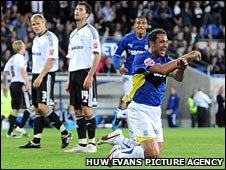 Before I talk about them though, I’d like to have a brief look at what happened last night from a Derby viewpoint. Nigel Clough was right to claim that his team paid for being so seriously disrupted, especially at centre back, by injuries. However, this made the decision that the visitors would play with a high back line and rely on an offside trap (a policy which needs much practice beforehand by the defenders as individuals and as a unit) when they had so many players out all the more strange.
Before I talk about them though, I’d like to have a brief look at what happened last night from a Derby viewpoint. Nigel Clough was right to claim that his team paid for being so seriously disrupted, especially at centre back, by injuries. However, this made the decision that the visitors would play with a high back line and rely on an offside trap (a policy which needs much practice beforehand by the defenders as individuals and as a unit) when they had so many players out all the more strange.
Derby’s approach might have been understandable if, for example, they were up against a couple of static, target men type strikers, but given the presence of Chopra and McPhail, especially, in the opposition it was asking for trouble.
Our opponents may have set themselves up in a way designed to bring out the best in them, but Chopra and McPhail still had to deliver and didn’t they just! In Chopra’s case he gave a master class in finishing and playing on the shoulder of the last defender with his hat trick goal being my favourite, but, incredible as it may seem when we are talking about someone who has scored four in a match, I don’t think he was our man of the match on the night.
For me that accolade goes to Steve McPhail. On the way to the game I listened to Jason Perry describing McPhail as a “brave” footballer because, no matter how the team is doing he always “shows” for defenders looking to pass the ball rather than lump it upfield and he also tries passes that are ambitious but carry a risk of losing possession thereby drawing groans from the crowd. I agreed with Perry regarding the first bit of that analysis but not with the second because for about fifteen months, McPhail has struck me as having become a “backwards and sideways” passer who has started to look for the safe option.
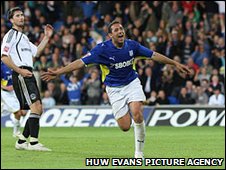 However, last night, given the chance to hit Chopra and others with quick and accurate passes over a variety of distances by the opposition’s tactics, McPhail cut Derby to ribbons. He also showed an ability to win the ball which hasn’t always been present and was instrumental in ensuring that the team didn’t start the match as sloppily as they have been doing recently.
However, last night, given the chance to hit Chopra and others with quick and accurate passes over a variety of distances by the opposition’s tactics, McPhail cut Derby to ribbons. He also showed an ability to win the ball which hasn’t always been present and was instrumental in ensuring that the team didn’t start the match as sloppily as they have been doing recently.
Dave Jones copped a lot of flak for recently rating Steve McPhail amongst the best midfielder’s in the Championship and, any City fan who was seen much of his play over the past fifteen months could only assume that this was designed to boost the player’s confidence. However, are there many midfielders in the Championship who could have done a better job in unpicking the Derby defence with the opportunities he was presented with last night?
McPhail was presented with conditions which were all in his favour against Derby and exploited them to the full – the challenge for him, Michael Chopra and the rest of their team mates, that Graham Hick failed to meet, is to make a better job than they have done of handling situations where the odds are not so much in their favour.

